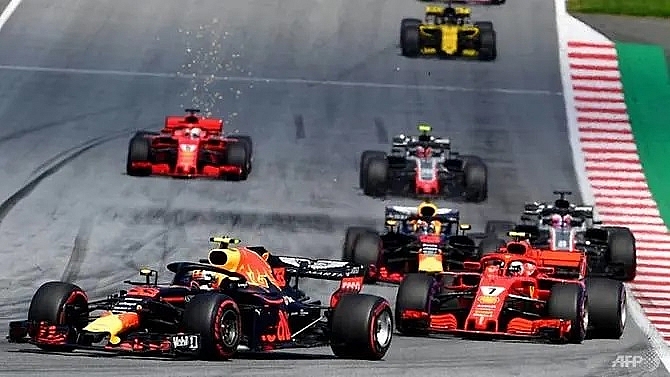Formula One unveils eight-race schedule in Europe from Jul 5
 |
| Austria's Red Bull Ring will host the first two races of the coronavirus-hit Formula One season in early July AFP/ANDREJ ISAKOVIC |
Formula One said it hoped to have between 15 and 18 races in total, with the season being completed in December.
The F1 season was thrown into chaos with the cancellation of the traditional curtain-raising Australian Grand Prix in March only hours before practice was due to begin as the coronavirus pandemic spread across the world.
Last week, the Austrian government sanctioned the season-opening double-header at the Spielberg circuit after F1 organisers "presented a complete and professional plan" to combat the COVID-19 outbreak.
The Hungarian Grand Prix will be brought forward to July 19 before a two-week break, followed by consecutive races in Britain and events in Spain, Italy and Belgium. All will likely be run without spectators while participants must adhere to strict safety protocols.
Regular health tests will be conducted with the number of team members and race staff at the venue also reduced.
"While we currently expect the season to commence without fans at our races we hope that over the coming months the situation will allow us to welcome them back once it is safe to do," said F1 chief executive Chase Carey.
"But we know the return of Formula 1 will be a welcome boost to sports fans around the world."
F1 managing director Ross Brawn last month said the Red Bull Ring circuit's remote location made it a "logical" choice to stage the season's first two races.
"BLUEPRINT TO FOLLOW"
With a local airport, the races can be held in an isolated environment, essential in the fight against the pandemic that has killed less than 700 people in Austria, and more than over 375,000 worldwide.
"Red Bull have pulled out all the stops to get the Austrian Grand Prix up and running, in order to support a safe start to the Formula One season," said team principal Christian Horner.
"It has been a huge effort by all involved and the two events at the Red Bull Ring will be a blueprint for all other races to follow.
He added: "With the first eight races of the calendar now confirmed we have some positive momentum. As a race team and racers, we are excited to get going again and put on a show for our fans."
Silverstone will host two races in Britain on Aug 2 and 9, with the Spanish Grand Prix set for Barcelona on Aug 16.
The Belgian and Italian Grands Prix will take place on their original dates of Aug 30 and Sep 6, completing the European part of the season. Each event will also include the Formula 2 and Formula 3 categories.
The blueprint for the rehashed season features further races in Asia and the Americas in September, October and November before finishing in the Gulf in Bahrain and Abu Dhabi in December.
The 2020 season was to have featured a record 22 races, now it is set to be the shortest campaign since 2009 with races in Australia, Monaco, France and the Netherlands cancelled.
MotoGP is also expected to release an updated schedule shortly.
The first 11 races of the season have been either postponed or cancelled due to the global health crisis.
MotoGP organisers Dorna are awaiting Spanish government approval to start the truncated season with back-to-back races at the Jerez circuit in Spain on Jul 19 and 26.
Revised F1 calendar:
Jul 3-5: Austrian Grand Prix (Spielberg)
Jul 10-12: Styrian Grand Prix (Spielberg)
Jul 17-19: Hungarian Grand Prix (Budapest)
Jul 31-August 2: British Grand Prix (Silverstone)
Aug 7-9: 70th Anniversary Grand Prix (Silverstone)
Aug 14-16: Spanish Grand Prix (Barcelona)
Aug 28-30: Belgian Grand Prix (Spa-Francorchamps)
Sep 4-6: Italian Grand Prix (Monza)
What the stars mean:
★ Poor ★ ★ Promising ★★★ Good ★★★★ Very good ★★★★★ Exceptional
 Tag:
Tag:
Related Contents
Latest News
More News
- Muong Thanh Golf Club marks five years with flagship golf tournament (October 01, 2025 | 18:25)
- TCP Vietnam opens new youth sports yard in Danang (September 22, 2025 | 18:46)
- 'Run For The Heart' to return to Ho Chi Minh City this September (August 29, 2025 | 15:31)
- LION Championship 25 to feature title showdowns in Khanh Hoa (August 15, 2025 | 14:24)
- AFF Women’s Championship 2025: Vietnam defeat Thailand in tense showdown (August 15, 2025 | 14:21)
- Hung Yen win National U11 Football Championship – Nestlé MILO Cup 2025 (August 06, 2025 | 11:34)
- Vietnam win third consecutive ASEAN U-23 title (July 30, 2025 | 07:00)
- Game-changing tech and startups to star at Vietnam Sport Show (July 18, 2025 | 14:56)
- Vietnam women's team secure 6-0 victory over UAE in Asian Cup qualifiers (July 04, 2025 | 15:32)
- Herbalife Vietnam supports VnExpress Marathon Quy Nhon 2025 (June 17, 2025 | 17:38)






















 Mobile Version
Mobile Version